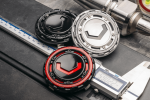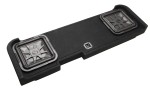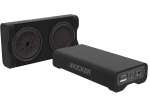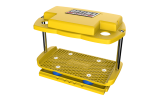That was the tag line for the original Kicker Solo-Baric subwoofers, and it was pretty true. Back in the 90’s, Kicker figured out a way to get a woofer to perform exceptionally well in  small sealed enclosures. These were very popular woofers, as they had great output, sounded good, and took up about half of the space of most of the competitive product at the time. Back in those days, I was working for a competitive brand and the Solo-Baric woofers were the ones to beat! Well, cars certainly haven’t gotten any bigger since then, so this year the folks at Kicker decided it was time to re-visit the concept. Technology however, has made some progress in the last 20 or so years and the new Kicker Solo Classic subwoofers have taken full advantage of that. Thanks to Ron Burnett, Kickers Sr. Marketing Communications Coordinator, I was fortunate enough to receive a new Kicker S10C woofer for testing.
small sealed enclosures. These were very popular woofers, as they had great output, sounded good, and took up about half of the space of most of the competitive product at the time. Back in those days, I was working for a competitive brand and the Solo-Baric woofers were the ones to beat! Well, cars certainly haven’t gotten any bigger since then, so this year the folks at Kicker decided it was time to re-visit the concept. Technology however, has made some progress in the last 20 or so years and the new Kicker Solo Classic subwoofers have taken full advantage of that. Thanks to Ron Burnett, Kickers Sr. Marketing Communications Coordinator, I was fortunate enough to receive a new Kicker S10C woofer for testing.
Starting with only the basic performance premise of the original Solo-Baric series as a guideline, the new Solo Classic woofers are all new, with one piece, fully braced SoloKon cones, stamped steel baskets, radially ribbed rubber surrounds and more. Cosmetics are classic Kicker, the woofer has an aggressive, meaningful appearance, with a low gloss finish to the ribbed cone, and nice textured black powdercoat on the basket and back plate. With the exception of a tiny bit of adhesive showing around the cone/surround joint, the woofer looks very well finished.
Features
The SoloKon cone is ribbed for added strength and rigidity, without increased mass. It’s attached to the ribbed rubber surround with not only the usual adhesives, but it also has two rows of stitching for added strength and reliability under high power conditions. The rugged long-throw surround itself is a bit unusual, utilizing twenty radially placed ribs to improve linear cone motion. Underneath the cone, a Nomex spider provides mechanical control to the suspension, as well as centering for the 2-inch diameter, 4 ohm, high temperature dual copper voice coils. The tinsel leads connecting the four main speaker wire spring terminals, are woven into the spider to prevent lead slap and improve reliability. Even the attachment of the 10 gauge terminals to the basket has received special attention, with a hard epoxy type substance preventing accidental terminal loosening. A large 6.1-inch double stacked ferrite magnet assembly provides the magnetic motor force, and is protected with a black molded rubber “boot”.
linear cone motion. Underneath the cone, a Nomex spider provides mechanical control to the suspension, as well as centering for the 2-inch diameter, 4 ohm, high temperature dual copper voice coils. The tinsel leads connecting the four main speaker wire spring terminals, are woven into the spider to prevent lead slap and improve reliability. Even the attachment of the 10 gauge terminals to the basket has received special attention, with a hard epoxy type substance preventing accidental terminal loosening. A large 6.1-inch double stacked ferrite magnet assembly provides the magnetic motor force, and is protected with a black molded rubber “boot”.
Listening
Having some experience with Kicker woofers, and knowing they recommend breaking in the woofers before beginning serious evaluations, I made sure the woofer was fully broken-in before I did any listening or testing. The break-in of any woofer can be accomplished simply by a few hours of enthusiastic use, or even a couple of weeks of low to moderate listening. Because I don’t have that kind of time, I used a 10Hz sinewave, at about 40 watts, with the woofer in a free-air environment. I chose 10Hz, because as I’m sure you know, with every halving of frequency, you increase cone excursion by 4 times, without increasing power. Very low frequencies make the woofer move a lot, which in turn allows the suspension of the woofer to loosen up, and normalize. It was during this very low frequency break-in that I noticed, this woofer has some serious excursion capabilities! After I was satisfied the break-in was complete, and while I was waiting for the woofer to completely cool, I installed it in a 0.65 cubic foot sealed enclosure, per the suggestion in the owners manual. Read it. Learn it. Know it. Live it!
Also in the manual was a very handy “cut list” in case you wanted to build your own enclosure. The Kicker S10C’s Thiele-Small parameters are also in the manual for those of you who like to play with computerized enclosure designs. But as I found out, there’s no need for tweaking box volume. Save the time, and just use the Kicker recommended volume.
My listening began with some old school, favorite bass tracks from Rush, Deep Purple and The Who. Listening to the late, great John Entwistle, who to me was the Jimi Hendrix of bass guitar, and his mind bending, giant bass lines was a real treat, and I began to understand Kicker had done it again. Switching sonic gears, I loaded up some big band tunes with plucked string bass, and drums that were recorded acoustically with coincident stereo microphones. Being something of a drummer myself, I like to use these tracks to see if the woofer system actually sounds like real drums, and the Solo Classic definitely did. The Solo Classic’s definition of the detail in this type of music was very good, and as always with really good gear, you just want to keep turning it up!
If heavy bass is your thing, the Solo Classic won’t disappoint there either. I played several Bass heavy tracks from 50 Cent, Nelly, Pussycat Dolls, Nine Inch Nails, and the woofer handled them with ease, right up to, and occasionally over the 450 watt power rating!
I was really pleased with the amount of output as well, the single 10-inch woofer had no problem filling my very large listening room with smooth, clean “round” sounding bass. The woofer is very musical, and it has quite a bit more output than I’m use to from a single 10-inch speaker, particularly when it’s in such a small box.
Read on for the Results
Related Articles
 KICKER to Make a Bang at Slamology This Weekend
KICKER to Make a Bang at Slamology This Weekend
 Vossen Wheels Modular Billet Caps
Vossen Wheels Modular Billet Caps
 KICKER Under-Seat Loaded Enclosures for Ford, GMC, Chevy, RAM
KICKER Under-Seat Loaded Enclosures for Ford, GMC, Chevy, RAM
 KICKER Introduces Pairs of 3-Way Component Systems
KICKER Introduces Pairs of 3-Way Component Systems
 Understanding Audio Radiators w/ KICKER
Understanding Audio Radiators w/ KICKER
 OPTIMA Batteries - Battery Mounts
OPTIMA Batteries - Battery Mounts



